With a wealth of knowledge and advice out there, it’s hard to know where to turn for reliable information on anything related to parenting, including evidence-based parenting books.
Here’s a short list of parenting books that are considered evidence-based as they are well-researched and based on perspectives alongside empirical data.
If you’re exhausted and looking to just talk with someone to help you with your parenting, consider working with a parent coach. But, in the meantime, here are 5 books you might want to check out to help you on your parenting journey.
Regardless of parenting style, there is something for everyone here. Whether you are looking for advice for your own children or are an educator working in school or childcare, you’ll find something useful in this collection of titles.
We’ve selected books that cover various perspectives within behavioral sciences, catering to different ages and parenting needs. These recommendations are listed alphabetically by the authors’ last names.
Five evidence-based parenting books to help parents be a better parent and raise happy kids:
- A Parent’s Guide to Oppositional Defiant Disorder by Amelia Bowler
- The Joy of Parenting by Dr. Lisa Coyne
- Raising Human Beings by Dr. Ross Greene
- Parenting with ABA by Leanne Page
- The Power of Showing Up by Daniel Siegel and Tina Payne Bryson
*All links are to Amazon, but the BHC receives no remuneration for clicks or purchases
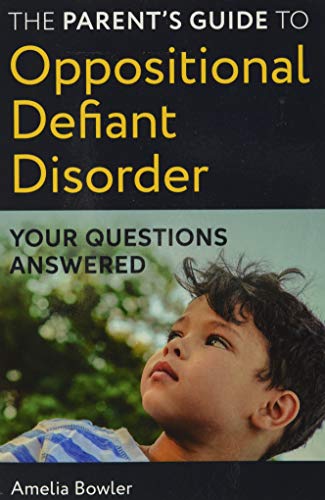
1. A Parent’s Guide to Oppositional Defiant Disorder by Amelia Bowler
As far as evidence-based parenting books go, this one is phenonmenal. Amelia Bowler provides a fantastic resource for parents and educators alike. Not only that, she also provides practical tools and strategies for supporting children with other diagnoses such as ADHD and autism, and it’s also really useful for neurotypical kids as well.
As a parent of a neurodiverse child with an ODD diagnosis, Amelia writes from her real-life experiences. Her credibility not only as a professional but as an experienced parent shines through in her realistic approach to parenting through challenging times.
Bowler sheds light on what parents and caregivers should be focusing on, rather than what might worsen or exacerbate the challenges a family may be facing. Some of these tips include adult self-regulation, being proactive, and looking at the environment to make changes rather than trying to change the child.
“To put it simply, most defiant and oppositional behavior happens when a child’s environment collides with his or her abilities” (Bowler 2020, p.33)
“Behavior happens for a reason. Your student’s behavior is affected by many things, including health, other people, and their personal history. If you want their behavior to change, you might need to show them a better way to get what they need, or change something in their environment.” (p. 106).
She points out that even common strategies that might work for other kids, and even have evidence behind them e.g. such as positive reinforcement, need to be re-considered for children with ODD.
This is precisely why this book is so valuable. You may read contradicting information in other so-called edvidence-based parenting books but, for a child with an ODD profile, strategies to support them need to be very carefully considered and unique to their needs.
“If your [child/student] has been hurt or neglected by someone who tried to control them, they might try to avoid both rewards and punishments. Even prizes and good grades can make them feel like they are accepting your control” (Bowler 2022, p. 67).
There are common misconceptions about parenting a child with any behavioral health challenges.
Bowler encourages readers to look for the mismatch between the child’s skills/needs and the environment they are living in (home, community, school).
One of the ways of looking at this is to consider the discrepancies between their skills and what the expectations of them are in the environments they are in every day. Her recommendation is staying proactive by focusing on teaching skills rather than letting them fail over and over.
“Success is a much more powerful teacher than failure, so keep your focus on the proactive ways you can meet your child’s needs and build up those important life skills” (p.22)
In fact, Amelia Bowler has written two great evidence-based parenting books. In 2022 Amelia published a similar book called A Teacher’s Guide to Oppositional Defiant Disorder. This is a great read as she includes practical worksheets for educators to guide them through the process of supporting a child with an ODD diagnosis.
For a deeper dive into her work on ODD, check out this article on Parenting a Child with ODD.
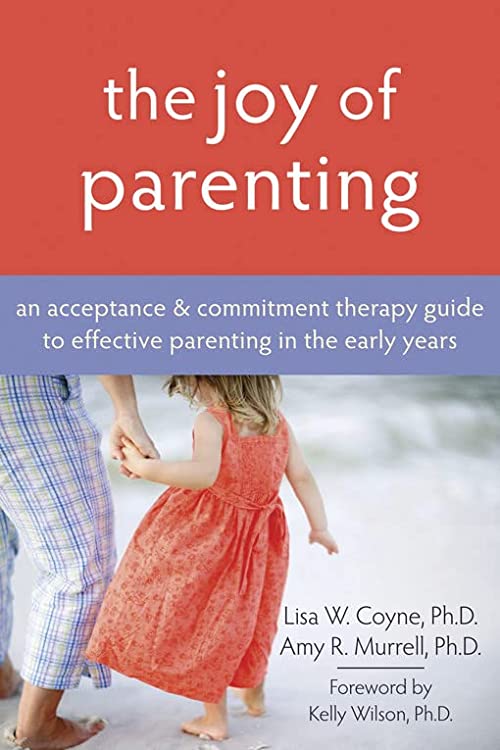
2. The Joy of Parenting by Dr. Lisa Coyne and Amy R. Murrell
This evidence-based parenting book is based on Acceptance and Commitment Therapy (ACT). Coyne and Murrell use their expertise in clinical psychology to provide practical guidance for when parenting gets hard.
ACT is rooted in behavior analysis and has a large body of research behind it. Coyne and Murrell illuminate the challenges of parenting and how to acknowledge and accept these challenges, stop struggling against them, and parent in a way that moves you and your family towards your values.
The Joy of Parenting is more about how to navigate the experience of parenting and the challenges it brings for YOU as the parent, rather than how to parent your child.
Any parent knows there are complex emotions, thoughts and feelings that come along with the job of parenting.
You might doubt your ability to deal with certain situations, you may judge yourself or others on parenting techniques, or you might find yourself struggling to shift and adapt with your child as they enter a new developmental phase.
These are some of the challenges of parenting young children that Coyne and Murrell walk the reader through.
“ACT-based parenting will help you compassionately acknowledge and accept your feelings, worries, or perceived inadequacies. In the most challenging moments, the goal is to notice and accept your feelings and thoughts as they are, without attempting to change them, so that you may appreciate your child in the moment and stand up for what matters most—for what’s most meaningful in your relationship with your young child.” Coyne & Murrell, The Joy of Parenting (p. 4).
Rather than taking a child’s behavior head-on with strategies to help parents build up their skill set, Coyne and Murrell point out and address an important part of the equation in parenting: the thoughts and feelings of the parent themselves.
By acknowledging and addressing this important part of the parent, the authors educate readers on how ACT can help parents navigate these tricky things when they show up.
You might have the best parenting skills in your arsenal but it’s no secret that effective parenting can be hindered by our own thoughts and feelings as parents— even when things are going well.
“Your mind…may criticize you when you don’t parent effectively, and that can make things worse. The good news is that you can choose to mind—or be mindful of—your child instead of minding your mind.” (p. 8)
Coyne & Murrell invite readers to use a parenting journal to participate in experiential activities throughout the book, which is a big part of ACT. A significant part of these experiential activities are based in mindfulness.
This may or may not be something you are familiar with, but I assure you it isn’t a spiritual experience if this is something that seems off-putting for you.
It is simply a means to focus your attention on the present moment (p. 11). Of course, participating in these activities is optional but I do like that readers have this option.
Another great feature of this book are the chapter summaries. For busy and overtired parents, this is a great way to recap and reference back to things you’ve learned in the book in a quick and easy manner.
Knowing that parents will find certain developmental stages more challenging than others, Coyne & Murrell address some of these milestone moments between the ages of 2-4 & 5-8 in order to support parents during these challenging times.
Personally, I felt validated hearing them acknowledge the frustration of a 2 year-old having strong opinions and discovering their autonomy.
That feeling of being understood and provided with strategies to work through those frustrating moments, not just in how I interact with my child but strategies to notice what I’m feeling and thinking about while interacting with my child, was incredibly helpful.
“It is a behavioral approach, which means it highlights your actions and their consequences, especially those that will help you move toward what you really care about for you and your child.” (p. 35)
An important part of ACT is being aware of and living in service of your values. I really love the experiential activities that they use to walk parents through the process of identifying or clarifying one’s values.
Providing practical ways to stop and think through this is helpful for busy parents. I often think about how hard it is as a parent to find the time and mental space to think and process. Using Coyne & Murrell’s activities can be incredibly helpful with this as it’s guided and not too open-ended.
They go on to walk parents through behavioral strategies for supporting children through acting out/challenging behavior as well as anxious children, while using an ACT approach.
They write this evidence-based parenting book in such an accessible manner that doesn’t require a parent to get a degree, but rather provides the basics of behavior and ACT needed to understand how to foster a positive relationship with your child and navigate the tricky times.
If you want an ACT-trained therapist as a parent coach you can search for one here, on the Association for Contextual Behavior Science (ACBS) website or check out the Behavioral Health Collective FindXpert site to search for an ACT-trained therapist.
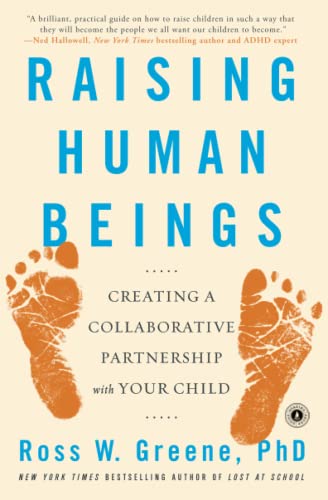
3. Raising Human Beings by Dr. Ross Greene
Ross Greene’s Collaborative and Proactive Solutions (CPS model) is an evidence-based parenting book that can be useful for any parent. In this book he goes into detail about the process of working with your child to find mutually-agreeable solutions.
This is based on the idea of giving your child a sense of agency and autonomy. Parents are encouraged to take a helping role of figuring out how to solve problems that result from a mismatch in expectations and your child’s ability/skills to meet those expectations.
“Every kid struggles to meet expectations sometimes, some more than others. In other words, there are times when there is incompatibility between your child’s characteristics and the demands and expectations that are being placed on her” (Greene, 2026, p.10)
Greene provides a plethora of examples throughout the book. He describes and demonstrates both how to have these conversations with your kids, through three general steps but also provides a lot of practical support for troubleshooting based on your child’s responses.
You might be thinking, ‘How do I get my kid to problem-solve with me?’ Well, the foundation of this is Greene’s first step of empathy. Here he teaches parents how to listen so kids will talk and open up.
“You’ll need to see beyond the behavior and focus on identifying and solving the problems that are causing it. Behavior is what’s going on downstream. You want to focus on upstream, on resolving the incompatibilities that are causing the behavior” (Greene, p. 17)
Next he addresses how parents can still have boundaries and voice their concerns and then finishes with the collaborative step in which your child is invited to problem-solve a mutually-agreeable solution.
This might sound too simple, but it actually is that simple. That’s what I love about the CPS approach. It’s straightforward enough that parents don’t have to keep consulting the book to be successful. However, if you do run into some roadblocks, he’s got lots of examples on how to address a variety of challenges you might come across.
Greene finishes by walking readers through the lifespan of a child and some examples of how parents pay to be collaborative with their child at each unique phase.
Finally, he highlights the life skills children gain from using the collaborative approach to problem-solving and may assuage some parental concerns through a question-and-answer format about using this approach versus more dictatorial or passive approaches.
In fact, the question-and-answer format, in combination with lengthy examples of actual conversations between parents and their children make Raising Human Beings a very accessible book and easy to digest.
This also makes it easy to find specific advice from Greene on the challenge you may be facing while skipping over other content that is not relevant to your situation, rather than having to read the whole book over again.
This book is also applicable to teachers and educators. Greene addresses home-school collaboration and the approach is easily transferable to school, despite the examples being between parent and child.
Whether parenting a 3 year-old or 17 year-old, you will find something useful in this powerful resource. As far as style goes with evidence-based parenting books, this is one of the best for a parenting style that is relational and gentle but still values boundaries.
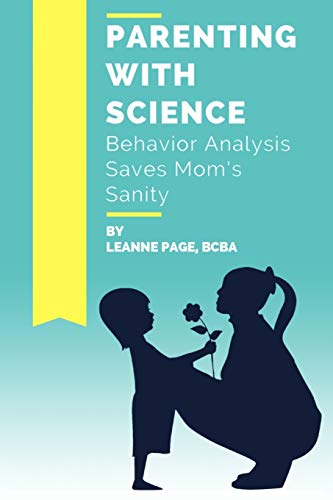
4. Parenting with Science by Leanne Page
“We can’t change our kid’s behaviors, but we can change the things around them to encourage positive behavior change” (Page, 2015, pg. 6)
Child rearing is not easy. The early years can be challenging when you’re trying to manage tantrums from toddlers, working on potty training for preschoolers and still trying to stay sane and manage your own mental health as a parent or caregiver. Not to mention, time. Parents don’t have a lot of this to spare!
Leanne Page offers up a very short and succinct read in this evidence-based parenting book that is laid out in a very simple format, organized by strategy. Actually finishing an evidence based parenting book doesn’t have to be time consuming!
These positive behavior-support strategies are based in behavior analysis and backed by research. As she notes, these strategies are especially helpful in the early years but can also be really useful as background knowledge, framing how you continue to raise your older children.
While ABA is often associated with an autism diagnosis, there are basic behavioral principles that apply to humans such as the principles of reinforcement. All strategies that Page covers are antecedent strategies.
This means they are preventative strategies that are to be used to set up the home environment in a way that prevents challenges from coming up in the first place. Page is quick to mention at the outset they are not consequence-based strategies.
Packing a lot into a 57-page evidence-based parenting book, Leanne obviously knows what moms (and other parents or caregivers) need to hear. The book is geared towards moms of young children but still is applicable to other caregivers and examples can be translated to work for older kids too.
Concepts like positive reinforcement and task analyses are broken down in everyday language and Page hits the key points to each strategy, peppering each section with common examples that parents come across every day.
At the end of each (short) section, there is also a summary table she’s created so you can easily refer back to the book to recall something.
If you’re a parent who likes a straightforward, simple, and structured approach to parenting, this is a great resource for you. I’d recommend this to expecting or new parents as well to set up the home environment and your relationship with your child so that these strategies can be incorporated early.
Finally, if you have a partner who is scientifically minded and likes an orderly approach to parenting, this can be a great starting point for them. No fluff. Just basic principles of human behavior distilled into a short little book.
Leanne also manages an active online parent community on Facebook, if you want some help problem-solving or support from a like-minded parent group.
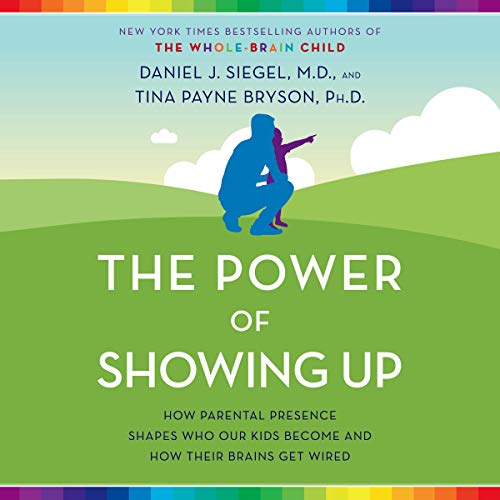
5. The Power of Showing Up by Daniel Siegel & Tina Payne Bryson (Ph.D.)
This evidence-based parenting book offers a really interesting perspective that distills all parenting strategies down to a simple framework based on attachment science and interpersonal neurobiology. The simple framework is all about helping your children feel safe, seen, soothed and secure in order to facilitate secure attachment.
Research shows secure attachment has many positive outcomes for children throughout their lifetime. As a medical doctor with postgraduate training in pediatrics and psychiatry, Dr. Siegel is knowledgeable about how young children develop. He bases his advice on science and research.
“The longitudinal research on child development clearly demonstrates that one of the very best predictors for how any child turns out— in terms of happiness, social and emotional development, leadership skills, meaningful relationships, and even academic and career success— is whether they developed security from having at least one person who showed up for them (Siegel and Bryson, 2020 p. 5) “
Whether you are parenting young children or an adolescent, this book is a must-read.
This evidence-based parenting book brings in a neuroscience component, helping the reader understand how a child’s brain wires over time, depending on the experiences they are exposed to.
Understanding more about brain development in young children can help parents and caregivers consider their interactions with the child and how critical it is to consistently show up for your child.
Payne and Siegel emphasize the importance of parents/caregivers to reflect on their own childhood and attachment to their parents and caregivers. They encourage readers to create their own narrative of their childhood experience in order to be intentional about parenting.
“History is NOT destiny. By making sense of your own story, you can be the kind of parent you want to be—regardless of how you were parented” (p. 28)
The various attachment styles are described in detail including what secure, avoidant, ambivalent, and disorganized attachment can look like in a parent-child relationship.
The authors then go into detail about each of the 4 pillars of secure attachment and how to show up for your child in each of those ways. Their examples are relatable and practical as they explain to parents common parenting scenarios and ways you can intentionally show up for your child.
“When parents consistently show up, their children’s minds come to expect that their world is a place that can be understood and meaningfully interacted with—even in times of trouble and pain. Showing up thus creates in our kids neural pathways that lead to selfhood, grit, strength, and resilience” (p. 9)
Bryson and Siegel provide an accessible understanding of how the basis of good parenting is much more simple than we may think. It’s about focusing on the parent-child relationship and being present for your child.
While they get into the details of what this looks like, this is the overarching theme. It’s more than being physically present, but being emotionally available to your child. This evidence-based parenting book has timeless takeaways, useful for any parent.
Bottom line on evidence-based parenting books
Whatever parenting style you end up taking on, consider these evidence-based parenting books as guidelines on how to support the overall well-being of your family and children specifically.
Whether you are parenting for the first time and are using the first year of your child’s life to prepare for the future, or are struggling with a new age and phase of older children, there are resources out there to support you as a parent right where you are.
While we’ve listed only 5 in this article, there are other evidence-based parenting books out there that are sure to suit your style. Reach out if you’d like help finding them.
Please drop a comment about any other evidence-based parenting books you have found to be helpful!
If how you’ve been doing things doesn’t seem to be working, consider trying a new strategy or approach out to see the results. As a behavior analyst, I’d always recommend keeping track if something is working or not so you can make objective decisions on whether to move on to a new approach or not.
If you find yourself really at a loss for how to solve some specific challenges with your child, consider reaching out to a parent coach. To find out more, check out this article What is a Parent Coach Anyway!?. If you want to connect with someone, search on the BHC’s Findxpert to locate someone near you or to help via telehealth.
Here you can find general parenting coaches or one’s more specialized in addressing specific challenges such as toilet training, for example.
When what you’ve been doing has been working so far, you may not feel the need for extra help but there is nothing wrong with getting a second opinion and some fresh ideas from a professional when you feel stuck and what you’re trying stops working.
Citations
Bowler, Amelia. (2020) The Parent’s Guide to Oppositional Defiant Disorder. Jessica Kingsley Publishers.
Bowler, Amelia. (2022) The Teacher’s Guide to Oppositional Defiant Disorder. Jessica Kinglsey Publishers.
Coyne, Lisa W.; Murrell, Amy R..(2009) The Joy of Parenting. New Harbinger Publications. Kindle Edition.
Greene, Ross W. (2019) Raising Human Beings. Scribner.
Siegel, Daniel J.; Bryson, Tina P. (2020). The Power of Showing Up. Ballentine Books.
Page, Leanne. (2015). Parenting with Science: Behavior Analysis Saves Mom’s Sanity. BCBA Today.
Disclaimer: If you are concerned about the safety of your child or family, call your local emergency medical services. This article is not medical advice. Consult with a pediatrician to address concerns around specific diagnoses for your children.

